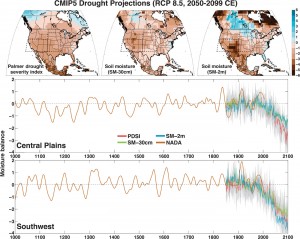
Unprecedented 21st century drought risk in the American Southwest and Central Plains
Benjamin I. Cook, Toby R. Ault, Jason E. Smerdon,
Science Advances 01 Feb 2015:
The new paper by Ben Cook and colleagues clarifying our understanding the risk of megadrought in the southwestern United States has rightly gotten a lot of attention. Combining paleo records and modeling of a changing climate under rising greenhouse gas scenarios, Cook and his colleagues have created some scary reading:
[F]uture drought risk will likely exceed even the driest centuries of the Medieval Climate Anomaly (1100–1300 CE) in both moderate (RCP 4.5) and high (RCP 8.5) future emissions scenarios, leading to unprecedented drought conditions during the last millennium.
My question to you, dear readers: What are the policy implications? In what way is this actionable? If you’re Terry Fulp at the Bureau of Reclamation’s Lower Colorado River Regional Headquarters in Boulder City, Nev., or Jeff Kightlinger at the Metropolitan Water District of Southern California, or Kevin Kelly at the Imperial Irrigation District, what would you be doing different today, now that you have had a chance to read Cook et al., that you weren’t already doing a month ago, before the paper came out?

Much of what I’m learning about as I climb into wateworld are short term adaptations, worth doing, no question. No one seems to figure out the political will to do the obvious big long term changes, like cut the greenhouse gases, like quit sucking the aquifers dry, like quit throwing bad things into the water we have. Maybe Cook et.al. will put some juice into those efforts. Problem is we featherless bipeds of the anthropocene are loss aversive, so we tend towards the short term problem rather than accepting a short term cost for a long term problem that isn’t part of the immediate moment. Maybe we need a Disney-like drought-park to make concrete the dismal predictions. Then again, maybe the dismal predictions are overrated. We dunno how this is going to play out, given the nonlinearity of all the changes in play. Far as I know, all we’re sure of is that it’s going to get warmer and we’re on the way into a new planetary environment, the nature of which we won’t be sure of until we get there.
With the range of climate models superimposed upon a range of population growth models, is it possible to project even roughly the gallons-per-person limits that will be required for ongoing habitation in the face of ongoing drought? Are there stories anywhere of successful negotiation of the Urban/Rural city/farm dichotomy of need that bear scrutiny? If there is a significant chance that conservation would not be enough to sustain a SW population, are there promising technologies of water capture and transport from wetter regions out there?
Is there a powerful vested interest opposed to water conservation to interfere with initiatives to decrease use? And are there successful models of significant behavioral change in a large diverse population in anticipation of still distant challenges or threats, and what is in common to any such success stories?
Are there any data on the elasticity of demand for water? Seems obvious, but would this relationship support a major impact on conservation by small changes in water price?
Seems like one of the cards always played by Climate Change Deniers is the Cost now for what they believe an unlikely threat later. Are there lessons there in how to frame such concerns and address incremental change in a way that doesn’t get tied up in some larger ideological package?
The more I think about the complexity of it – not even touching on the water effectively imbedded in the manufacturing of microprocessors as much as alfalfa – and the problem of unifying the response of a huge complicated population to concerns that are matters of probabilities, the more it seems we need Bloomberg-proportion funding to study all these issues and more not for academic conference, but for a range of deliberate and politically savvy maneuvers to improve the chances that the Rio Grande will reach the ocean again someday…
From a pragmatic standpoint maybe a question should relate to, “What’s in it for the politicians?”. It has been reported that more than half of the American public does not believe that climate change is man-caused and a serious issue to come. If that is true, then perhaps that is a place to start. If you work for BOR or a water utility the choices seem to come down to actions that prohibit use, like high cost and restricting the uses for water. Public education, for all the resistance that invariably ‘crops’ up (pun intended), is a go-to action that is swallowed up by the political arena driving national and local policies. Constructing a socio/bio/political bionics factory that churns out politicians and agency administrators with actual backbones would be a start.